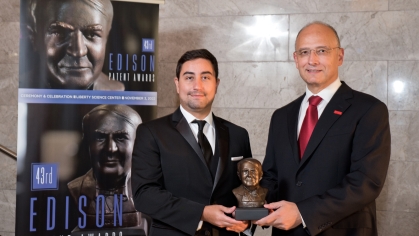Rutgers Receives NTIA Funding to Develop Next-Generation Wireless Communications Technology

Rutgers School of Engineering is among the collaborating university and industry partners—including project lead NYU Tandon School of Engineering, Princeton, NYU’s Pi-Radio, Nokia, and Analog Device—receiving funding support from a $10 million award from the National Telecommunications and Information Administration (NTIA) to develop microchips and wireless systems for adaptive and resilient cellular wireless networks.
The project, SALSA (Spectrally Agile Large-Scale Arrays), aims to bolster U.S. leadership in open and secure communications infrastructure by creating an advanced, upper mid-band radio frequency integrating circuit (RFIC) for the Open Radio Access Network, or O-RAN, framework to be used in emerging commercial networks.
The RFIC will be designed for the Open Radio Access Network (O-RAN) framework to enable deployment in emerging commercial networks. The award comes through the NTIA's Public Wireless Supply Chain Innovation Fund, established under the CHIPS and Science Act to promote O-RAN development and domestic manufacturing of telecommunications equipment, seen as crucial for economic competitiveness and national security.
SALSA’s collaborative team, under the direction of the project’s lead investigator Sundeep Rangan, associate director of the NYU WIRELESS research center and a professor of electrical and computer engineering at NYU Tandon, will develop specialized wireless chips, build modular radio platforms, integrate with open network standards, and analyze system performance.
“Relationships between universities, government, and industry are an important means by which the U.S. can foster innovation, drive economic growth, and solve emerging societal problems,” says Narayan Mandayam, Rutgers University’s Wireless Information Network Laboratory (WINLAB) director and a distinguished professor in the School of Engineering’s Department of Electrical and Computer Engineering. “We’re pleased to be able to contribute to this important project.”
With its unrivaled capabilities in preliminary testing of prototypes, WINLAB will play a crucial role in SALSA’s success. Its O-RAN Test and Integration Centers, one of the few such centers in North America, will be leveraged along with its testing facilities – indoor ORBIT lab in New Jersey and outdoor COSMOS testbed in New York City – to support the SALSA team’s development and deployment of next-generation wireless technology.
NYU Tandon will oversee a team of academic and industry partners to achieve those objectives. Pi-Radio—a startup spun out of NYU Tandon that received sponsorship from NYU WIRELESS, the Center for Advanced Technology in Telecommunications, and the NTIA—will lead development of the physical radio platform - including packaging, antennas, and system integration.
Princeton University’s Professor Kaushik Sengupta and NYU Tandon Assistant Professor Hamed Rahmani bring considerable expertise in advanced RFICs and will lead the development of the proposed radio microchip itself.
Nokia, a global leader in wireless network infrastructure and NYU WIRELESS affiliate member, will evaluate SALSA technology for cellular networks. The evaluation results will be used for future product design requirements for commercialization.
Analog Devices, a global semiconductor leader and also an Industrial Affiliate member of NYU WIRELESS, will provide specialized radio hardware that helps connect the project's wireless technology to O-RAN, making it compatible with equipment from different manufacturers.
“At WINLAB, we’re excited to evaluate new FR3 technology using the newly developed RFIC-based system and its integration into the O-RAN ecosystem,” says Ivan Seskar, chief technologist for WINLAB and program director of the COSMOS testbed, who serves as the Rutgers PI on the project. “This collaboration not only brings novel bands to 5G/6G but also paves the way for innovative advancements in wireless technology and the development of next-generation wireless systems.”
Mandayam adds, “This recent NTIA award strategically complements WINLAB's research leadership in both the FR3 spectrum and O-RAN. WINLAB has been funded by the NSF on multiple projects investigating the coexistence of next generation terrestrial 5G/6G wireless networks with satellite networks for both digital video broadcast and weather sensing. WINLAB's role as a leading OTIC (O-RAN Test and Integration Center) in North America will be further enhanced by supporting the SALSA project.”


